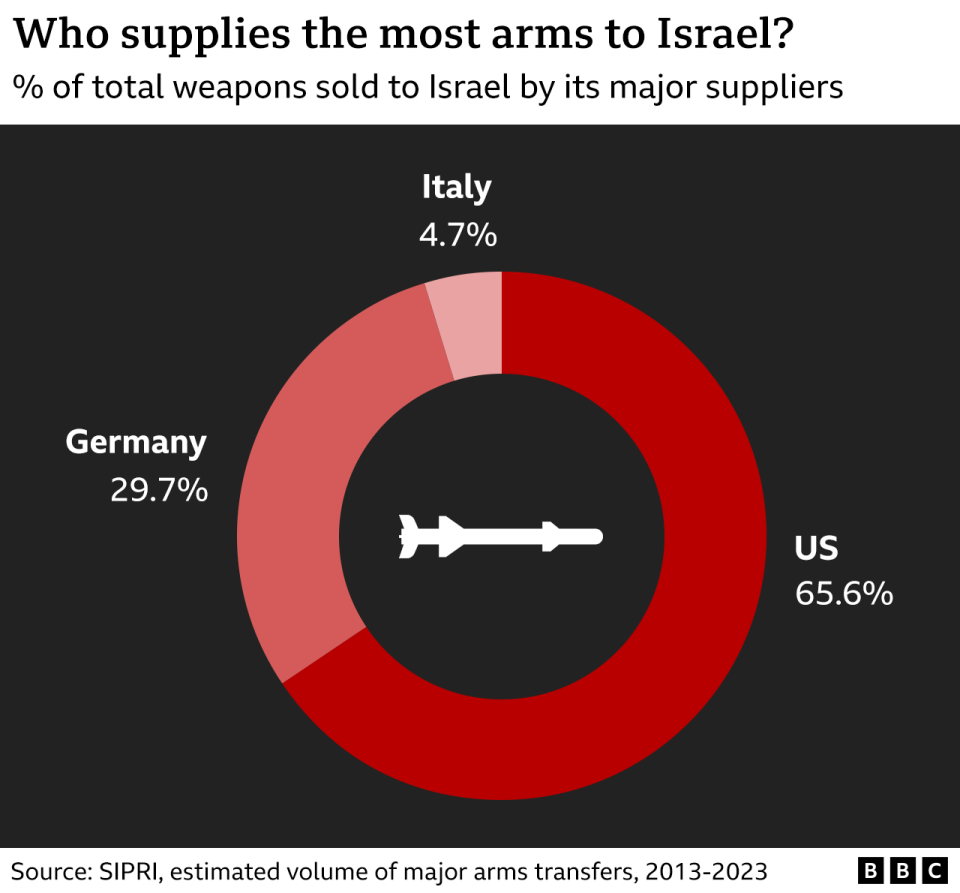[ad_1]
Nicaragua has asked the UN's highest court to halt German arms sales to Israel at the start of a landmark case.
Germany faces accusations of violating the United Nations Genocide Convention by sending military equipment to Israel and halting funding for the United Nations relief agency.
Berlin rejects these allegations and will present a defense before the International Court of Justice on Tuesday.
In 2023, about 30% of Israel's purchases of military equipment came from Germany, totaling €300 million ($326 million; £257 million).
The allegations are based on a separate case brought by South Africa in January, which was heard by judges in The Hague. He ordered Israel to take “all possible measures” to avoid acts of genocide. The court also ordered Hamas to immediately release all hostages taken by Israel during its attacks on October 7.
Israel rejects accusations that it is committing acts of genocide in its campaign in Gaza, and insists that it has the right to defend itself.
The Hamas-run Ministry of Health there says that more than 33,000 people were killed in the Israeli attack on Gaza, the majority of them civilians. Gaza is on the brink of famine, with Oxfam reporting that 300,000 people trapped in the north have been living since January on an average of 245 calories a day.
Nicaragua says German arms sales to Israel, which totaled $326.5 million last year — a tenfold increase from 2022 — make it complicit in Israel's alleged war crimes.
Components of air defense systems and communications equipment accounted for most of the sales, according to the German News Agency.


Germany was also one of 15 Western countries to do so Suspending funding to the United Nations Relief and Works Agency for Palestine Refugees (UNRWA) Due to allegations of the involvement of some agency employees in the October 7 attacks on Israel.
According to papers submitted to the International Court of Justice, Nicaragua wants the UN Supreme Court to order Berlin to stop arms sales and resume funding for the relief agency, one of the few international bodies still working in Gaza.
In the absence of such measures, he says, “Germany is facilitating genocide and failing in its obligation to do everything in its power to prevent genocide.”
Speaking as the trial began, Nicaraguan lawyer Alain Pellet said it was “urgent for Germany to suspend ongoing sales.”
He told the judges that “Germany was, and remains, fully aware of the danger that the weapons it provided and continues to supply to Israel could be used” to commit genocide.
Berlin has rejected these accusations, but has remained silent about its legal strategy ahead of the hearings.
Government spokesman Wolfgang Buchner said, “We have learned of the lawsuit filed by Nicaragua and we deny these accusations as unjustified.”
Chancellor Olaf Scholz was an outspoken supporter of Israel's right to self-defense, but faced growing domestic hostility to continued arms sales to the country.
On Sunday, a group of government employees wrote to the German leader calling on the government to “immediately stop delivering weapons to the Israeli government.”
“Israel is committing crimes in Gaza that clearly contradict international law,” the statement said, citing the International Court of Justice ruling issued in January.
In the January case, the International Court of Justice ruled that “at least some of the acts and omissions alleged by South Africa committed by Israel in Gaza appear to be capable of falling within the provisions of the Convention.”
Michael Baker, a law professor at Trinity College Dublin, told the BBC that there was uncertainty about states' obligations to prevent genocide or ensure respect for humanitarian law. He said the case against Germany could help clarify the issue.
Critics of the Nicaragua case have highlighted the country's checkered human rights record. The government of President Daniel Ortega imprisoned opponents and banned protests. In March, the UK's mission to the United Nations accused the government of a “relentless” crackdown on human rights.
[ad_2]
Source

